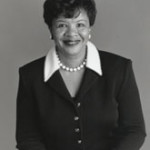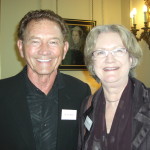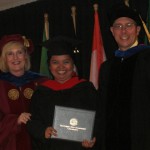I’ve just been invited to become an Executive-in-Residence at an extraordinary international executive education business school in Lausanne, Switzerland, IMD. While visiting there, I met with their president, deans, program directors and faculty and am deeply impressed by the depth and breadth of their offerings. I especially appreciate their emphasis on “real life, real learning.” In collaboration with their remarkable team, I will focus on responsible leadership and corporate social responsibility. I welcome your input on specific issues you think I should explore and I will continue to post as this new work unfolds. Among their 100 MBA candidates, are 60 nationalities. Similarly, the thousands of executives who participate in their specialized programs hail from myriad countries and their international faculty is comparably diverse. IMD is ranked... more
corporate citizenship

I was enthralled when Georgetown University Law Center Professor Emma Coleman Jordan gave the Fourteenth Annual Derrick Bell Lecture on Race in American Society. Her talk, “Race and New Economic Connection in Subprime Crisis” was the most coherent analysis of economic justice I’ve ever heard. Everything she spoke about relates to points I’ve made in my recent posts on Inequity and to issues I’ve explored for decades. But she wove together myriad strands of insight into the most magnificent whole cloth that made simple to grasp incredibly complex topics. She is best known for establishing the field of economic justice in legal theory and for her work in financial services and civil rights. Listening to her at NYU Law School... more
As a board member often chairing governance sub-committees, I have used Sarbanes-Oxley as the gold standard not just to guide procedures of for-profit but also of not-for-profit organizations. While the latter were not covered under Sarbanes-Oxley, I have advocated that non-profits who followed its guidelines would be at the cutting edge of best practices in good governance. The New York Times piece by Floyd Norris “Goodbye to Reforms of 2002” describes how congress already has substantially gutted Sarbanes-Oxley over the years and now plans to further remove most of its teeth. The 2002 Congress passed the Sarbanes-Oxley Act, which required public companies not just to have internal controls against fraud – something by law they had to do since 1977–... more
Graham Bowley’s pieces in The New York Times “Bailout Helps Fuel New Era Wall Street Wealth” and “Bonuses Put Goldman in Public Relations Bind” and The Financial Times editorial “Public Needs More Bang for Its Buck” are among a rash of recent articles describing a disparity that virtually everyone is experiencing. I find great cause for concern about the trend these pieces expose, as history shows that depriving many people of even the fundamental basics while a select few benefit astronomically never is sustainable. Frank Rich’s earlier op-ed “The Rabbit Ragu Democrats” highlights how the main relationships businesses currently cultivate are with lobbyists who can press their pet concerns with government officials. His is a cautionary tale of the adverse affects... more

I’d worked with diplomats and women’s rights activists from several nations to promote the passage in 2000 of 1325, a UN Security Council Resolution that mandates the protection, participation and promotion of women and their involvement in all aspects of peace processes. Last week, during the opening of 64th UN General Assembly, I attended “Peace and Security through Women’s Leadership: Acting on 1325 and Climate Change” chaired by Presidents Ellen Johnson Sirleaf of Liberia and Tarja Halonen of Finland. They once again declared a call to action for implementation of 1325 before its 10th anniversary next year. They also focused on the incorporation of a gender perspective to be included in the negotiations for a new agreement on climate change. This meeting was a follow up... more
Women and girls are the key to sustainable development and have the capacity to resolve myriad crisis that plague our world. I applaud the many insightful articles in today’s The New York Times Magazine with the cover “Why Women’s Rights Are the Cause of Our Time” (emphasis my own). I have been an advocate of the perspective highlighted in these pieces and I encourage you to read all of them. As Nicholas Kristof and Sheryl WuDunn wrote in their 21st century manifesto, there is growing recognition among leaders from all sectors – public and private – that supporting women and girls throughout the world is the solution for many of the world’s problems. As Mark Landler wrote in his piece... more
Akash Kapur’s New York Times article describes through his personal experiential lens, “creative destruction,” a concept Joseph Alois Schumpeter popularized in his 1942 book Capitalism, Socialism and Democracy. Kapur describes how innovative entrepreneurial development that can sustain long-term economic growth bringing wealth to some in previously impoverished areas, simultaneously often destroys the values of a culture, fabric of a community and the natural beauty of an environment. The July 2009 issue of the Chicago Journals Economic Development and Cultural Change’s articles address this phenomenon from different perspectives in various countries’ initiatives. Since I’ve long supported sustainable development initiatives in the US and throughout the world, I continue to explore with all types of leaders – from local communities to national governments... more

The speakers at 10 Downing Street included our host Sarah Brown, Archbishop Desmond Tutu, Anne Aslett of the Elton John AIDS Foundation and Dillon Woods of the Donald Woods Foundation (DWF) who each explained why they support the comprehensive services provided by DWF, all created with shared ownership by the residents in the Mbashe area of South Africa’s Eastern Cape. They believe as I do that only through an engaged, empowered multi-faceted approach do local communities achieve self-sustainability. I have learned over decades of work that whether you are a business, an NGO or a government when you follow the guidance of local leadership, help strengthen local capacity and collaboratively address problems from multiple angles, you can create sustainable success. DWF does exactly this... more

I attended the preview screening for “Black in America 2, Soledad O’Brien Reports”, a CNN four-hour documentary that premieres on July 22 with “Tomorrow’s Leaders” and July 23 with “Today’s Pioneers.” I encourage you to watch this two-part series as it features extraordinary programs that serve as highly successful and replicable models. While I was inspired by all six, I was particularly touched by an initiative Malaak Compton-Rock started at the Bushwick Brooklyn Salvation Army Community Center called Journey for Change. Thirty children were chosen to participate. First they served their own community and then had a two-week service trip to a South African township. Read the Journey for Change blog to see what these kids have learned and what they... more

I gave the Graduation Commencement Speaker at Southern New Hampshire University’s International Program of their Graduate School of Community Economic Development today. The students are practitioners from around the world who already have made significant contributions to development efforts in many nations. With the Masters of Science in International Community Economic Development they received at this degree ceremony, they will leverage their ability to achieve even greater accomplishments. After an excerpt of my remarks, also watch video clips of graduate speeches. Also post your comments about successful economic development efforts, whether by corporations, governments or NGOs. Keeping with the spirit of international cooperation fostered in this graduate program, rather than choosing a single student to make commencement remarks, a group did a... more

